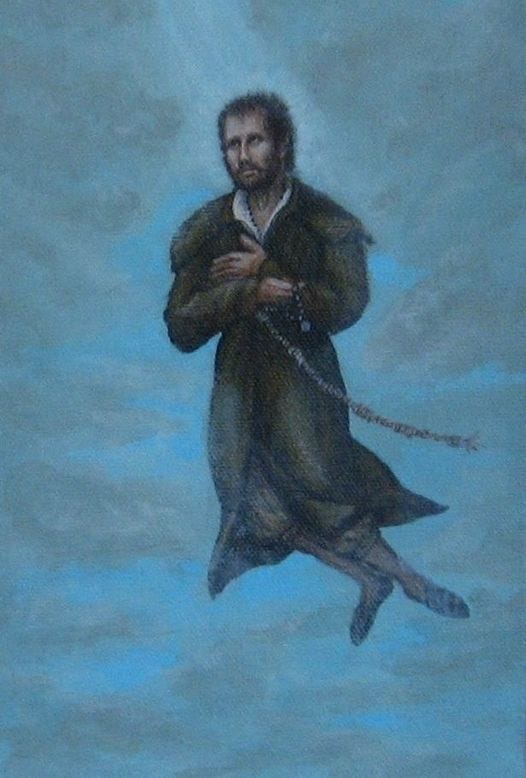April 16 Saint Benedict Joseph Labre: Levitated During Eucharistic Adoration.
April 16 Saint Benedict Joseph Labre: Levitated During Eucharistic Adoration.
1748-1783
Patronage:
Unmarried men (bachelors)
rejects
mental illness
mentally ill people
insanity
beggars
hobos
the homeless
.
Saint Benedict Joseph is considered the patron saint of the homeless, single men, and of those suffering with mental illness. As a clinical psychologist, I find the life story of Saint Benedict Joseph both extremely poignant and inspirational, and pray that his intercession may draw more attention to the plight of the homeless and mentally ill around the world.
.
Benedict Joseph was born to a middle class family in France, the eldest of 15 children. His parents ensured that he was provided with the finest educational opportunities as he matured, but Benedict Joseph only appeared interested in those that would bring him closer to the Lord. From a young age he demonstrated tendencies toward deprivation and mortification, avoiding the normal fun and frivolous activities of childhood, and gravitating toward prayer and fasting. As an adolescent, he was sent to live and care for an ailing uncle, who continued his education in Latin and divinity.
.
Benedict Joseph was single-minded in his pursuit of holiness. He was determined to enter a religious order, specifically the Trappists. For many years he traveled to different orders, seeking admission, but was always turned away at the onset due to his age, or following admission, due to his health. It is likely, although unknown, that Benedict Joseph suffered from a serious mental illness, yet throughout his suffering, remained true to the Lord, constantly seeking a deeper union with Him.
.
Following his multiple rejections from religious orders, Benedict Joseph changed his plan. As his confessor wrote in his biography, he determined “that it was God's will that like St. Alexis he should abandon his country, his parents, and whatever is flattering in the world to lead a new sort of life, a life most painful, most penitential, not in a wilderness nor in a cloister, but in the midst of the world, devoutly visiting as a pilgrim the famous places of Christian devotion".
.
He did just that, leaving his home and family with only the clothes on his back, two Rosaries, a crucifix, a Bible, a breviary, and some religious texts. Having no food, he sustained himself on whatever he could find, refusing alms offered to him, and giving anything in excess of what he needed to the poor. He slept outside, on the ground, oftentimes trading comfort for discomfort so as to suffer more. Saint Benedict Joseph traveled throughout Europe on foot for approximately 13 years, estimated to have walked over 20,000 miles visiting various religious pilgrimage sites and shrines. He finally settled in Rome, where he lived on the streets for the last 6 years of his life.
.
It was in Rome that he became known as a “fool for Christ,” and the “Saint of the Forty Hours” (Quarant’ Ore), due to his dedication to prolonged Eucharistic adoration. During this adoration, or more pronounced when he meditated on the crown of thorns worn by our Savior, Benedict Joseph is reported to have levitated or bilocated. A host of additional miracles are attributed to him, including miraculous cures of those he encountered, and multiplication of bread and food for his fellow homeless. He was well-known throughout the city for his holiness, kindness, and cheerful demeanor despite what was a very difficult existence.
.
Saint Benedict Joseph Labre died of malnutrition in 1783. Due to his popularity, his body was laid in state for nearly a week, and visited by thousands during that time. 136 separate miraculous cures were attributed to him in the first 3 months following his death. His body was laid in a tomb, at an altar in a chapel of Santa Maria dei Monti in Rome, where it remains today.
.
The life of Saint Benedict Joseph Labre reminds us that the Lord loves and has a beautiful plan for all His creations, despite what society may judge or view them as. Despite his mental illness, Benedict Joseph continually strived throughout his life to grow closer to the Lord, to serve Him, and to serve as an example for others. He faced multiple rejections with grace, and eventually changed his plan in obedience to God, never giving up his search for holiness. We are challenged by the life of this saint to consider our own actions, both when we encounter difficulties in our lives that prevent us from following the will of God, and also when we encounter those individuals in our communities who society has written off, marginalized, and judged as less than. What is our mandate, as disciples of Christ, to those that are suffering?
.
34 Then shall the king say to them that shall be on His right hand: Come, ye blessed of My Father, possess you the kingdom prepared for you from the foundation of the world. 35 For I was hungry, and you gave Me to eat; I was thirsty, and you gave Me to drink; I was a stranger, and you took Me in: 36 Naked, and you covered Me: sick, and you visited Me: I was in prison, and you came to Me. 37 Then shall the just answer Him, saying: Lord, when did we see Thee hungry, and fed Thee; thirsty, and gave Thee drink? 38 And when did we see Thee a stranger, and took Thee in? or naked, and covered Thee? 39 Or when did we see Thee sick or in prison, and came to Thee? 40 And the king answering, shall say to them: Amen I say to you, as long as you did it to one of these My least brethren, you did it to Me.(Matthew 25:34-40)
.
From 365 rosaries blogspot.



